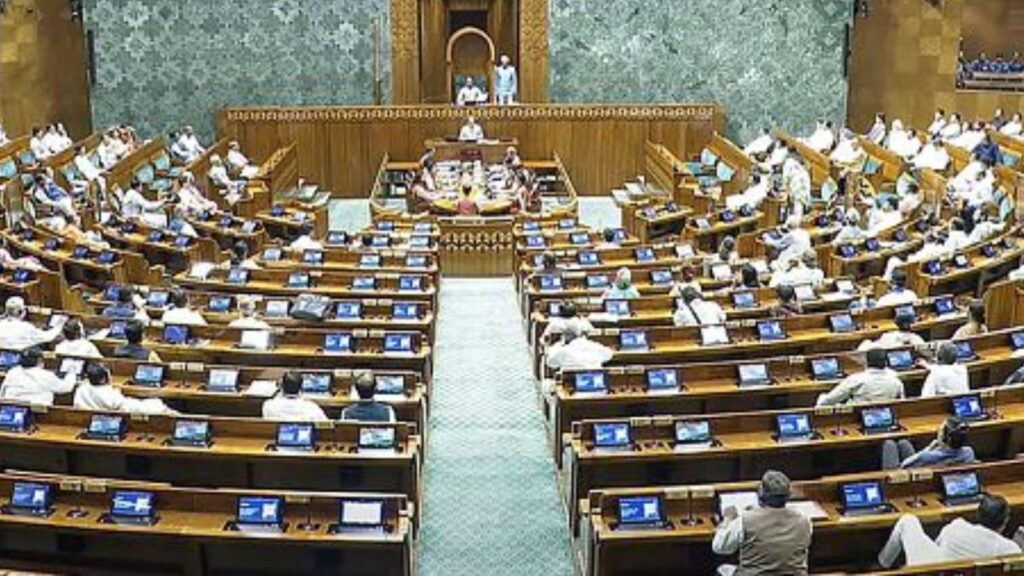The logjam in Parliament looks likely to continue in the coming days, with the Opposition firm on its demand for a discussion on the ongoing Special Intensive Revision (SIR) of electoral rolls in poll-bound Bihar and the government arguing that the working of an autonomous Constitutional body cannot be discussed on the floor of the House.
Lok Sabha Speaker Om Birla and Rajya Sabha Deputy Chairman Harivansh have already rejected several notices from the Opposition seeking a discussion on the issue. To register their protest against the exercise, the Opposition INDIA bloc will march to the Election Commission (EC) headquarters in Delhi on Monday.
* Since when has Parliament been at a standstill?
The Monsoon Session began on a stormy note on July 21 with the Opposition demanding a discussion on the SIR, the Pahalgam attack, and Operation Sindoor.
The Centre allocated 16 hours each for a debate on Operation Sindoor. While the Lower House held the debate on July 28 and 29, the Upper House debated the issue on July 29 and 30.
However, both Houses had not seen any business being transacted before that and haven’t seen any since as Opposition MPs continue to press their demand for a discussion on SIR by submitting notices each day under Rule 267.
On Friday, Harivansh said the notices were “being used as a tool to create disorder in the (Upper) House.” The Monsoon Session is scheduled to conclude on August 21.
* What is Rule 267?
While the Rajya Sabha rule book does not provide for an adjournment motion, over the years, MPs in the Upper House have used Rule 267 to suspend Question Hour and raise urgent matters.
“Any member may, with the consent of the Chairman, move that any rule may be suspended in its application to a particular motion before the Council and if the motion is carried the rule in question shall be suspended for the time being,” the rule stated in 1952.
However, a committee headed by then Chairman Krishna Kant and 15 MPs amended the rule in 2000. The panel observed that members were using the rule to “seek discussion either on a matter not listed in the agenda for the particular day or on a subject that has not yet been admitted”. The committee recommended an amendment to allow the suspension of a Rule for a matter “related to the business listed before the Council of that day”.
It also added a proviso that if an existing procedure allowed suspending Rules (like suspension of Question Hour), an MP could not use 267. So now, Rule 267 can be used only to suspend a Rule, only to take up matters that are already on the list of business.
* What is the government’s stand?
On August 6, rejecting the Opposition’s demand, the Centre in the Lok Sabha said the matter could not be discussed on the floor of the House as it was sub-judice, referring to pleas against the exercise in the Supreme Court.
Some Opposition MPs have suggested a discussion on “electoral reforms” to end the logjam in Parliament.
Union Parliamentary Affairs minister Kiren Rijiju told the Lok Sabha last week that the government has been “very open to discussing any matter”. “However, any discussion in the Parliament has to be in accordance with Constitutional provisions and the rules as prescribed in the rules of procedure and conduct of business in the Lok Sabha,” he said.
Rijiju also cited a 1988 ruling by then Speaker Bal Ram Jakhar that under the existing Constitutional provisions, the House cannot comment upon the actions of the EC. Jakhar, according to Rijiju, had said that he cannot break the rules by allowing a discussion on the functioning of EC.
* What is the Congress’s argument?
To reject the government’s argument, the Leader of the Opposition in the Rajya Sabha, Mallikarjun Kharge, cited former Chairman Jagdeep Dhankhar’s July 21, 2023, ruling in which he said the House was authorised to “debate anything under the sun and under the planet”.
Congress Deputy Leader in the Lok Sabha, Gaurav Gogoi, has listed similar precedents from 1961, 1981, 1995, and 2005 to point to the government’s “lack of preparedness to take accountability” and discuss the issue.
“In 1961, the Rajya Sabha debated amendments to the Conduct of Elections Rules — the discussion was led by then Law Minister Gopal Swarup Pathak… In 2015, a Calling Attention Motion was moved by Rajya Sabha LoP Ghulam Nabi Azad on proxy and e-postal voting for NRIs. Law Minister D V Sadananda Gowda accepted the Opposition’s demand to consider their views,” Gogoi said in a social media post on August 6.
“And as recently as 2019, a Short Duration Discussion on electoral reforms saw participation from the then Law Minister Ravi Shankar Prasad,” Gogoi said, adding that the Lok Sabha had a “long, bipartisan tradition of discussing electoral reforms and the functioning of the EC”.

